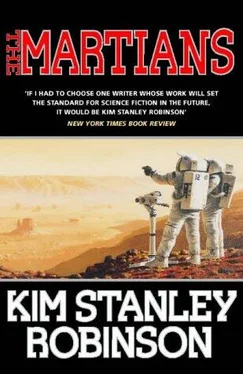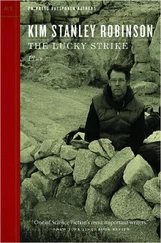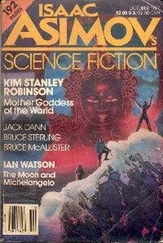Chapter 27
The Names of the Canals
Lestrygon, Antaeus, Cimmeria, Hyblaeus, Scamander, Pandoraea, Fretum, Hiddekel. Phison, Protonius, Python, Argaeus.
Mostly Greek, Latin, and Hebrew. Some names refer to real features, visible from Earth through early telescopes: the big volcanoes, Hellas and Argyre, the great canyons, the dark land on Syrtis, the shifting polar caps.
Idalius, Heliconius, Oxus, Hydroates.
But the lines. Lines connecting everything. Even at the time illusory lines were known to occur between dark dots in a telescope, a matter of optics and vision. And the minimal width of any line that could be visible on Mars through those telescopes was known to be hundred kilometers. And yet the names. We want life. We want to live.
Cadmus, Erigone, Hebrus, Ilisus.
So silly. But I too I live in a world I love.
Pyriphlegeton, Memnonia, Eumenides, Ortygia.
I live in a big valley, on its flat floor, the mountains on both sides visible on most days, the smaller range closer to the west, the larger one farther away to the east. To north and south, as far as the eye can see, a valley. A valley about as wide as a Martian canal.
Chapter 28
The Soundtrack
Before work every morning, espresso and Steve Howe’s “Turbulence.” For Red Mars, Glass’s Satyagraha. For Green, Ahknaten. For Blue, Mishima and The Screens. For Maya, Astor Piazzolla, especially “Tango: Zero Hour.” For Ann, Gorecki’s Third Symphony, Paul Winter’s “Sun Singer,” and the Japanese folk song “Sakura.” For Sax, Beethoven’s late string quartets and piano sonatas. For Nadia, Louis Armstrong 194656, also Clifford Brown and Charles Mingus. For Michel, Keith Jarrett’s “Köln Concert.” For Nirgal, Najma. And always Van Morrison, Pete Townshend, and Yes.
Van when I’m happy
Pete when I’m mad
Steve when I’m energetic
Astor when I’m sad
Chapter 29
A Martian Romance
Eileen Monday hauls her backpack off the train’s steps and watches the train glide down the piste and around the headland. Out the empty station and she’s into the streets of Firewater, north Elysium. It’s deserted and dark, a ghost town, everything shut down and boarded up, the residents moved out and moved on. The only signs of life come from the westernmost dock: a small globular cluster of yellow streetlights and lit windows, streaking the ice of the bay between her and it. She walks around the bay on the empty corniche, the sky all purple in the early dusk. Four days until the start of spring, but there will be no spring this year.
She steps into the steamy clangor of the hotel restaurant. Workers in the kitchen are passing full dishes through the broad open window to diners milling around the long tables in the dining room. They’re mostly young, either iceboat sailors or the few people left in town. No doubt a few still coming out of the hills, out of habit. A wild-looking bunch. Eileen spots Hans and Arthur; they look like a pair of big puppets, discoursing to the crowd at the end of one table—elderly Pinocchios, eyes lost in wrinkles as they tell their lies and laugh at each other, and at the young behemoths passing around plates and devouring their pasta while still listening to the two. The old as entertainment. Not such a bad way to end up.
It isn’t Roger’s kind of thing, however, and indeed when Eileen looks around she sees him standing in the corner next to the jukebox, pretending to make selections but actually eating his meal right there. That’s Roger for you. Eileen grins as she makes her way through the crowd to him.
“Hey,” he says as he sees her, and gives her a quick hug with one arm.
She leans over and kisses his cheek. “You were right, it’s not very hard to find this place.”
“No.” He glances at her. “I’m glad you decided to come.”
“Oh, the work will always be there, I’m happy to get out. Bless you for thinking of it. Is everyone else already here?”
“Yeah, all but Frances and Stephan, who just called and said they’d be here soon. We can leave tomorrow.”
“Great. Come sit down with the others, I want some food, and I want to say hi to the others.”
Roger wrinkles his nose, gestures at the dense loud crowd. This solitary quality in him has been the cause of some long separations in their relationship, and so now Eileen shoves his arm and says, “Yeah yeah, all these people. Such a crowded place, Elysium.”
Roger grins crookedly. “That’s why I like it.”
“Oh of course. Far from the madding crowd.”
“Still the English major I see.”
“And you’re still the canyon hermit,” she says, laughing and pulling him toward the crowd; it is good to see him again, it has been three months. For many years now they have been a steady couple, Roger returning to their rooms in the co-op in Burroughs after every trip away; but his work is still in the backcountry, so they still spend quite a lot of time apart.
Just as they join Hans and Arthur, who are wrapping up their history of the world, Stephan and Frances come in the door, and they hold a cheery reunion over a late dinner. There’s a lot of catching up to do; this many members of their Olympus Mons climb haven’t been together in a long time. Hours after the other diners have gone upstairs to bed, or off to their homes, the little group of old ones sits at the end of one table talking. A bunch of antique insomniacs, Eileen thinks, none anxious to go to bed and toss and turn through the night. She finds herself the first to stand up and stretch and declare herself off. The others rise on cue, except for Roger and Arthur; they’ve done a lot of climbing together through the years, and Roger was a notorious insomniac even when young; now he sleeps very poorly indeed. And Arthur will talk for as long as anyone else is willing, or longer. “See you tomorrow,” Arthur says to her. “Bright and early for the crossing of the Amazonian Sea!”
The next morning the iceboat runs over ice that is mostly white, but in some patches clear and transparent right down to the shallow sea floor. Other patches are the color of brick, with the texture of brick, and the boat’s runners clatter over little dunes of gravel and dust. If they hit meltponds the boat slows abruptly and shoots great wings of water to the sides. At the other side of these ponds the runners scritch again like ice skates as they accelerate back up to speed. Roger’s iceboat is a scooter, he explains to them; not like the spidery skeletal thing that Eileen was expecting, having seen some of that kind down in Chryse—those Roger calls DNs. This is more like an ordinary boat, long, broad, and low, with several parallel runners nailed fore and aft to its hull. “Better over rough ice,” Roger explains, “and it floats if you happen to hit water.” The sail is like a big bird’s wing extended over them, sail and mast all melded together into one object, shifting shape with every gust to catch as much wind as it can.
“What keeps us from tipping over?” Arthur asks, looking over the lee rail at the flashing ice just feet below him.
“Nothing.” The deck is at a good cant, and Roger is grinning.
“Nothing?”
“The laws of physics.”
“Come on.”
“When the boat tips the sail catches less wind, both because it’s tilted and because it reads the tilt, and reefs in. Also we have a lot of ballast. And there are weights in the deck that are held magnetically on the windward side. It’s like having a heavy crew sitting on the windward rail.”
“That’s not nothing,” Eileen protests. “That’s three things.”
“True. And we may still tip over. But if we do we can always get out and pull it back upright.”
Читать дальше
Конец ознакомительного отрывка
Купить книгу












